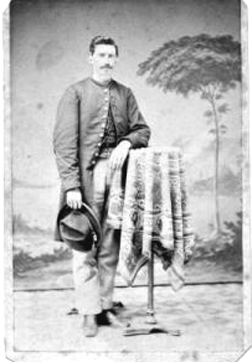Mournful Intelligence: A Guthrie Gray Writes After Chickamauga
Despite being in intense pain from his own wounds, Captain
Jules J. Montagnier of the 6th Ohio performed the melancholy task
that fell to company commanders during the Civil War of notifying the next of
kin of the death of one of the men under his command.
Montagnier,
born in Cincinnati in 1835 to a French veteran of Napoleon’s army, had been educated
at St. Xavier’s College in Cincinnati then went into the newspaper trade,
working as a typographer for the Cincinnati Enquirer and later editing the
largest circulating Know-Nothing organ of southern Indiana. The outbreak of the
war found him back in Cincinnati as a member of the old Guthrie Gray Battalion,
and Montagnier was among the first to respond to Lincoln’s call for 75,000
volunteers to suppress the rebellion.
Montagnier,
commissioned a second lieutenant in Co. G, would progressively rise to the rank
of captain and saw action with the 6th Ohio throughout the western
theater, including Shiloh, Stones River, and finally at Chickamauga where he
sustained two severe leg wounds on September 19th that led to his
discharge from the army, and ultimately contributed to his death in 1872 at the
age of 36. Initially sent home to Cincinnati to recover, Montagnier’s health
was broken by his wounds that he could only briefly return to his prewar life
in the newspaper business and spent the last three years of his life as an
invalid.
“All through the war, he was a
brave soldier and through all the hard service that fell to the lot of that
regiment to be engaged in, Captain Montagnier had his full share; but his whole
heart was in the cause and he never faltered and he was known and respected in
the regiment as one of the truest and bravest men in it,” his obituary from the
Society of the Army of the Cumberland read.
The 6th Ohio, part of
Colonel William Grose’s brigade, went into action at Chickamauga with 23
officers and 322 enlisted men and lost 110. Montagnier’s company lost three men
killed, one mortally wounded, five wounded, and three missing.
Montagnier’s
letter, one of four that he wrote to families of his deceased men after Chickamauga,
was written October 10, 1863 while he was convalescing in Cincinnati. It was
written to Colonel R.R. Allen of Hillsboro, Ohio to inform him that Allen’s son
Richard numbered among the slain at Chickamauga. Due to his own wound, “I am
consequently unable to give you any of the particulars of his demise. But from
the information I have received from the regiment in regard to it, his death
must have been almost instantaneous. The circumstances were such as not to
permit his remains being interred by his comrades,” Montagnier wrote. Private
Richard R. Allen remains in an unknown grave.
Montagnier’s letter originally appeared in the October 15, 1863, edition of the Highland Weekly News.
Cincinnati, Ohio
October 10, 1863
Colonel R.R. Allen, Hillsboro, Ohio
Dear sir,
The melancholy
task falls to my lot of apprising you officially of the death of your son
Richard R. Allen from wounds received in the Battle of Chickamauga on September
19, 1863. I was myself severely wounded before your son received the fatal
bullet that terminated his life and am consequently unable to give you any of
the particulars of his demise. But from the information I have received from
the regiment in regard to it, his death must have been almost instantaneous. The
circumstances were such as not to permit his remains being interred by his
comrades, but such effects as were on his person were taken charge of by First
Sergeant George B. Young of my company who will forward them to you at the
earliest possible moment.
On
communicating this mournful intelligence to you, permit me to tender to you the
sincere condolence and sympathy of a fellow soldier. As your son’s commanding
officer, I can assure you that his conduct was such as to entitle him to my
respect. During the time he was under my control, I never had occasion to
reprimand him for any dereliction of duty. On the contrary, his soldierly
bearing and neat and clean appearance frequently caused me to commend and
encourage him. He was in short, a fair type of true American soldier: intelligent
and obedient, prompt to perform what was required of him, and possessed of that
chivalrous courage which is destined to render our arms invincible.
 |
| Corporal Guy C. Nearing, Co. B, 6th O.V.I. Later probate judge in Wood County, Ohio |
The last time
that my attention was particularly attracted to your son was on the field of
battle. He was voluntarily engaged in an errand of mercy at the peril of his
own life- withdrawing a comrade (then supposed to be wounded but whose soul was
then in another world) from the fire of the enemy. This incident, illustrative
of his noble character, excited the admiration of those who beheld it.
Trusting that
you may bring to bear upon your affliction that resignation to the Divine Will
which is the surest consolation in the hour of trouble, I beg leave to
subscribe myself yours with sincere sympathy,
Letter from Captain Jules J. Montagnier, Co. B, 6th
Ohio Volunteer Infantry, Highland Weekly News (Ohio), October 15, 1863,
pg. 3











Comments
Post a Comment